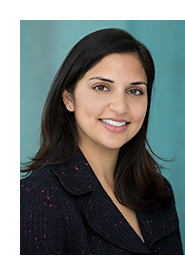PROFESSOR MAKHLOUF PRESENTS RESEARCH ON INTEGRATING SOCIOLEGAL SERVICES IN HEALTH CARE AT AALS ANNUAL MEETING
 January 2021 — Professor Medha D. Makhlouf recently presented her research on integrating sociolegal services in health care at two events during the AALS Annual Meeting. Professor Makhlouf highlighted different aspects of her research for the two programs, titled “Health Care Coverage Reform in the Shadow of COVID-19” and “Politics, Pandemic, and the Future of Civil Rights and Poverty Law.”
January 2021 — Professor Medha D. Makhlouf recently presented her research on integrating sociolegal services in health care at two events during the AALS Annual Meeting. Professor Makhlouf highlighted different aspects of her research for the two programs, titled “Health Care Coverage Reform in the Shadow of COVID-19” and “Politics, Pandemic, and the Future of Civil Rights and Poverty Law.”
In both presentations, Professor Makhlouf addressed the ways in which the pandemic has laid bare the structural inequities that underly poor health in certain segments of the population. She explained how financial and legal insecurity not only increase people’s risk of exposure to the virus; it also deters them from seeking health care and prevents them from safely isolating or quarantining when they are diagnosed or exposed. Therefore, there is an urgent need to break down the silos between health and human services in order to reduce disparities in COVID-19 morbidity and mortality. Human services encompass a broad range of services that support the physical, mental, and emotional health and well-bring of people and communities—and that are traditionally considered outside of or adjacent to health care. They address the social determinants of health, like nutrition, housing, education, employment, immigration status, and public safety. Professor Makhlouf proposes to integrate sociolegal needs screening and services with contact tracing during the pandemic in order to protect public health, build trust in the public health system, and provide tangible benefits to people during the pandemic. If this emergency intervention proves feasible and useful, it could serve as a model for broader and more sustained integration of human services in the healthcare system.
Professor Makhlouf was one of four panelists selected to present at the Section on Law, Medicine, and Health Care’s main panel, “Health Care Coverage Reform in the Shadow of COVID-19,” which explored how the COVID-19 pandemic has highlighted stressors in the U.S. healthcare system. In that presentation, Professor Makhlouf focused on how the lack of integration of health and human services during the pandemic created problems that should inform how we think about future health reform proposals. She discussed promising legal strategies and funding sources for integrating sociolegal needs screening and services in contact tracing and beyond.
In the joint program of the Civil Rights Section and Poverty Law Section, “Politics, Pandemic, and the Future of Civil Rights and Poverty Law,” Professor Makhlouf focused on the nuts and bolts of integrating legal needs screening and services with contact tracing by drawing on her experience directing Penn State Dickinson Law’s Medical-Legal Partnership Clinic. She described how lawyers can help contact tracing succeed by addressing barriers to safe isolation and quarantine that are caused or exacerbated by legal issues. For example, they can prevent evictions, secure safe housing conditions, ensure access to safety net benefits, protect against mistreatment by employers, provide counsel on immigration matters, and obtain protective court orders for survivors of abuse. These actions and others can help to build trust in the public health system and ensure compliance with isolation and quarantine instructions. Ultimately, Professor Makhlouf sought to provide her audience with a deeper understanding of why legal needs screening and services are vital to public health and the healthcare system.
Professor Medha D. Makhlouf is an Assistant Professor and Founding Director of the Medical-Legal Partnership Clinic at Penn State Dickinson Law. She has a joint appointment in the Department of Public Health Sciences at Penn State College of Medicine. Professor Makhlouf’s research and teaching interests lie at the intersection of health law, immigrants’ rights, and poverty law and policy. Her recent scholarship has been published or is forthcoming in the New York University Law Review, the Northwestern University Law Review Online, and the American Journal of Law and Medicine. Professor Makhlouf’s work is available at https://works.bepress.com/medha-makhlouf/.